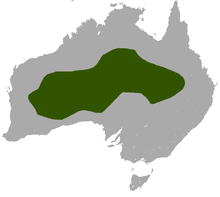Wongai ningaui
| Wongai ningaui[1] | |
|---|---|
| Scientific classification | |
| Kingdom: | Animalia |
| Phylum: | Chordata |
| Class: | Mammalia |
| Infraclass: | Marsupialia |
| Order: | Dasyuromorphia |
| Family: | Dasyuridae |
| Subfamily: | Sminthopsinae |
| Genus: | Ningaui |
| Species: | N. ridei |
| Binomial name | |
| Ningaui ridei Archer, 1975 | |
 | |
| Wongai ningaui range | |
The Wongai ningaui (Ningaui ridei), also known as the Inland ningaui, is a small carnivorous marsupial native to Australia.
Taxonomy
The Wongai ningaui and the Pilbara ningaui (N. timealeyi) were the two species of ningaui described by Australian biologist Mike Archer when the genus was erected in 1975 (the Southern ningaui, N. yvonneae, would be described in 1983), although the Pilbara ningaui was designated the type species. The Wongai ningaui was described from two subadult specimens collected near Laverton in Western Australia. The scientific name of this species honours the Australian naturalist W. D. L. Ride.[3]
Description
The Wongai ningaui has a head and body length of 64 mm, tail length of 65 mm and weight of 9.75g. Even smaller than a house mouse, the Wongai ningaui is greyish above and lighter below. It has a semi-prehensile tail, needle sharp teeth and a long snout. The name derives from an Aboriginal word for tiny mythological beings that are hairy, have short feet and only come out at night. Ningauis use their sharp teeth to kill their insect prey by swiftly biting them around the head. They hunt by night and rest among the spinnifex hummocks by day. The females have as many as five to seven young, the breeding season beginning in October.[1]
Distribution and habitat
The Wongai ningaui lives mostly in the interior of Australia, in deserts that have spinifex, or grasslands and trees such as desert oak, mulga, Australian Cypress Pine and dry heath.[1] Its range begins west of Kalgoorlie in Western Australia across northern South Australia and southern Northern Territory to southwestern Queensland.[4]
External links
References
- 1 2 3 Groves, C.P. (2005). Wilson, D.E.; Reeder, D.M., eds. Mammal Species of the World: A Taxonomic and Geographic Reference (3rd ed.). Baltimore: Johns Hopkins University Press. p. 32. OCLC 62265494. ISBN 0-801-88221-4.
- ↑ Woinarski, J.; van Weenen, J. & Burbidge, A. (2008). "Ningaui ridei". IUCN Red List of Threatened Species. Version 2008. International Union for Conservation of Nature. Retrieved 28 December 2008.
- ↑ McKenzie, N. L.; Dickman, C. R. (1995). "Wongai Ningaui". In Strahan, Ronald. The Mammals of Australia. Reed Books. pp. 116–117. ISBN 0-7301-0484-2.
- ↑ Menkhorst, Peter; Knight, Frank (2001). A Field Guide to the Mammals of Australia. Oxford University Press. pp. 62–63. ISBN 0-19-550870-X.
